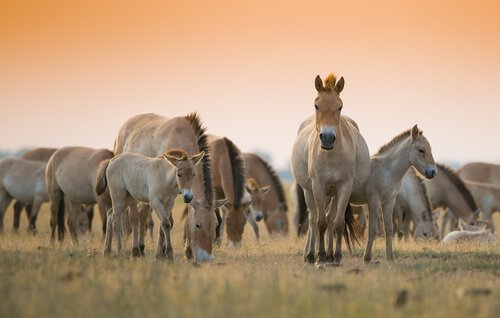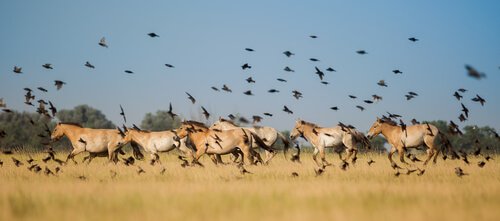Are there still wild horses?
The domestication of horses began many centuries ago and was essential for the economic and social development of humanity. Today, many equine breeds are recognized, but there is still much speculation that there are still wild horses on our planet.
This 'controversy' was revived by a recent and detailed study on the DNA of horses, published in the journal Science . According to the researchers, the Przewalski of Mongolia, targeted as the last surviving wild horses, could not really be considered as such.
In addition, genetic analyzes could revolutionize everything we assume about the origins of the modern horse. Next, we will learn more about this research to understand why wild horses they may already be extinct, even if the cinema shows us the opposite sometimes.
The classic hypothesis about the domestication of wild horses
To begin, let's review briefly the traditional and more accepts gives hypotheses about the domestication of horses. Experts believe that the first ones to domesticate horses were the Botai, about 5000 years ago , and that modern horses would derive from these equines.
These native peoples inhabited mostly in the north of what is now considered the territory of Kazakhstan. In their day to day, the Botai used horses for various activities beyond the displacement . For example, they used to milk the milk of the mares; they could even consume horse meat in times of food shortages.

Some vestiges found in its territory, such as the bitten strings, have also allowed us to suppose that the Botai harnessed the horses and kept them in a kind of corral. , the relationship between the Botai peoples and the horses included an interesting process of domestication.
Based on this information and evidence, it has been considered that the Botai would have materialized the ' first degree 'of the domestication of horses ; they took wild horses and managed to tame them, live with them and establish a beneficial relationship.
A study can change everything we assume about the origins of horses
Researchers from different universities have come together to carry out a meticulous and detailed study on the genetic evolution of the horse.
To carry out this study, they have selected and researched 88 genetic samples of modern and ancient horses , species that have lived in different periods and inhabited in various places within Eurasia.
The results of this genetic analysis have managed to surprise even the researchers themselves. As Ludovic Orlando, of the University of Toulouse, states, the findings shared with his colleagues " literally turn upside down what we thought we knew about the origin of modern horses ".

First, the studies Genetics would break down the belief that the Przewalski would be the last surviving wild horses.However, this key research could indicate, on the one hand, that wild horses are already extinct. And even more, it could revolutionize everything that was supposed up to then about the history and origins of the modern horse ...


